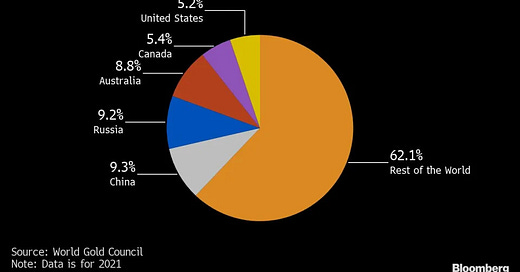May 5: Eddie Spence, Russian Gold Is in Hands of Obscure Firms as JPMorgan, HSBC Exit
As published on Yahoo News, May 3, 2023
Russian Gold Is in Hands of Obscure Firms as JPMorgan, HSBC Exit
By Eddie Spence, Yahoo News, May 2, 2023
With Russian gold shut out of Western markets, little-known companies are stepping in to help the country’s bullion find new buyers.
Russian bars became taboo after the invasion of Ukraine, and were blocked by Group of Seven nations and European Union import bans last summer. That created a big headache for Russia’s huge gold industry — its own market can’t absorb the $20 billion of metal mined each year, leaving the central bank or foreign buyers to take the rest.
Dozens of logistics firms and merchants that are small players in the gold sector have since taken over the Russian bullion trade, according to data from trade-tracking firm ImportGenius based on Russian customs figures for six months through August. And instead of massive shipments going to London to sit in vaults of top bullion banks like JPMorgan Chase & Co. and HSBC Holdings Plc, Russian supplies are heading piecemeal to places like the United Arab Emirates, Hong Kong and Turkey, where there are no restrictions.
It’s another example of how the global commodities trade is being rerouted in the wake of Russia’s war in Ukraine. G-7 and EU sanctions ban the import of Russian gold in their own markets and prohibit companies based in them trading it elsewhere. But firms in other countries are still allowed to deal in Russian metal due to the lack of secondary sanctions, so there’s no suggestion any rules are being broken.
Russia and Iran Are Building a Trade Route That Defies Sanctions
The global transport of precious metals is dominated by security companies like Brink’s Co. and Loomis, which stopped carrying Russian bullion after the war began.
The gap left has been filled by companies like VPower Finance Security (Hong Kong) Ltd., which says it moves cash and gold for some of China’s biggest banks. It handled more than $300 million of Russian gold shipments through Hong Kong in March through August 2022, ImportGenius data show.
It’s a fraction of the $1.2 billion of Russian gold delivered to JPMorgan in the first two months of 2022 alone, highlighting the challenge of selling big volumes immediately after the war began. But the new sales channels are helping, and miners Polymetal International Plc and Polyus PJSC have been able to draw down unsold stockpiles they built in the first half of 2022.
Export Destination
The UAE has emerged as the top new destination for Russian gold, with more than $500 million being exported there in the six months through August. Most buyers are based in Dubai, which has long been a hub for precious metals trading between the East and West. Paloma Precious DMCC, a trader with offices in Dubai’s free-zone and gold souk, imported $109 million, the data show.
Al Bahrain Jewellers LLC, another souk-based dealer, took over $50 million of gold from Russia. The metal was sourced through the Abu Dhabi-based subsidiary of Open Mineral AG, a trading firm founded by ex-Glencore Plc executives whose major shareholders include sovereign wealth fund Mubadala Investment Co.
Some Dubai merchants appear to have little specialized experience in precious metals. Actava Trading DMCC, which imported about $25 million of Russian gold in August, describes itself as a crop trader focused on the Black Sea region.
Paloma and Open Mineral declined to comment on the data. VPower, Al Bahrain Jewellers and Actava didn’t respond to emails and phone calls seeking comment.
Turkey has become another key destination, with about $305 million of Russian gold passing through Istanbul airport in the March-August period, ImportGenius data show.
There have also been shifts in who’s conducting transactions within Russia. The nation’s exports were previously dominated by major lenders like VTB Bank PJSC and Sberbank PJSC, but sanctions on them have seen smaller banks take more control. Miners and refiners have started taking a bigger role in shipments too.
Russia’s central bank has also been buying, purchasing about 1 million ounces in the past year or so. US sanctions imposed on Russia’s foreign-exchange reserves have spurred it to seek alternatives to the dollar.





